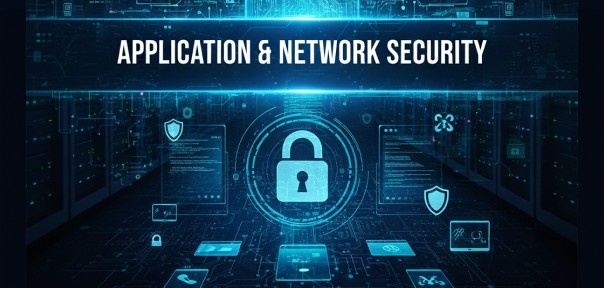University & Pro Programs
Free Network Security Courses

Learn Network Security Courses for Free & Get Completion Certificates
Network security is a critical discipline that focuses on protecting computer networks from unauthorized access, data breaches, and other malicious activities. It encompasses a range of practices, technologies, and strategies designed to secure the integrity, confidentiality, and availability of network resources and data. Network security is of paramount importance in today's digital landscape, where cyber threats and attacks are prevalent and evolving.
The primary goals of network security are:
Preventing Unauthorized Access: Network security aims to prevent unauthorized individuals or entities from gaining access to sensitive information or network resources. This involves implementing authentication mechanisms, such as strong passwords, two-factor authentication, and biometric systems, to verify the identity of users and grant access based on defined privileges.
Protecting Data Confidentiality: Network security ensures the confidentiality of data transmitted over the network. Encryption techniques, such as secure socket layer (SSL) and transport layer security (TLS), are used to encrypt data during transmission, making it unintelligible to unauthorized users who intercept the traffic. Additionally, access controls and data classification help limit access to sensitive information only to authorized personnel.
Safeguarding Data Integrity: Network security ensures the integrity of data by preventing unauthorized modifications or tampering. Techniques such as digital signatures, cryptographic hashing, and data integrity checks help verify the integrity of data during transmission and storage. Regular backups and disaster recovery plans are also implemented to protect against data loss or corruption.
Ensuring Network Availability: Network security aims to ensure the availability of network resources and services by preventing and mitigating disruptions caused by attacks or system failures. This involves implementing robust network architectures, redundant systems, and load-balancing mechanisms to distribute traffic and handle high loads. Intrusion detection and prevention systems (IDS/IPS) are employed to detect and block malicious activities that could compromise network availability.
Mitigating Cyber Threats: Network security focuses on identifying, preventing, and mitigating various cyber threats, including malware, viruses, ransomware, phishing attacks, and distributed denial-of-service (DDoS) attacks. This involves implementing firewalls, antivirus software, intrusion detection and prevention systems, and security patches and updates to protect against known vulnerabilities. Security awareness training and user education programs are also crucial in mitigating social engineering attacks and promoting secure behaviors.
Monitoring and Incident Response: Network security includes continuous monitoring of network activities and security events to detect and respond to potential threats or security incidents. Network administrators use security information and event management (SIEM) systems, log analysis, and real-time monitoring tools to identify anomalies, detect attacks, and respond promptly to security incidents. Incident response plans and procedures are in place to minimize the impact of security breaches and ensure a swift and effective response.
Network security is a complex field that encompasses a wide range of technologies and practices, including network segmentation, virtual private networks (VPNs), intrusion detection and prevention systems (IDS/IPS), next-generation firewalls, access controls, vulnerability scanning, and penetration testing. It requires a comprehensive and multi-layered approach, combining technical controls, security policies, regular audits, and employee training to establish a robust security posture.
In conclusion, network security is essential for safeguarding computer networks from unauthorized access, data breaches, and cyber threats. By implementing a combination of technologies, practices, and strategies, organizations can ensure the confidentiality, integrity, and availability of their network resources and data. Network security measures protect sensitive information, prevent disruptions, and mitigate the risks associated with the evolving threat landscape, allowing businesses to operate securely in the digital world.
Discover the most sought-after cybersecurity courses with certification to level up your skills and advance your career in the field of cybersecurity.
Frequently Asked Questions
How to learn Network Security for free?
You can enrol in Great Learning Academy's free Network Security courses that familiarize you with in-demand security skills. You can choose courses that best suit your learning level and learn crucial Network Security techniques.
How to do Network Security courses?
If you want to get familiar with it from a basic level, then Great Learning Academy offers free Network Security courses. You can dwell in the Network Security field through Great Learning’s Best Network Security Courses.
How to get Network Security certificates for free?
Great Learning Academy offers free Network Security courses that award you with free course completion certificates.
Why take Network Security Courses from Great Learning Academy?
Great Learning Academy is the visionary initiative by Great Learning, the leading e-Learning platform, to offer free industry-relevant courses. Free Network Security courses contain courses ranging from beginner-level to advanced-level to help learners choose the best fit for them.
How long does it take to complete these Network Security courses?
These free Network Security courses offered by Great Learning Academy contain self-paced videos; hence learners can learn them at their convenience.
Will I have lifetime access to these Network Security courses with certificates?
Yes. You will have lifelong access to these free Power BI courses Great Learning Academy offers.
What are my next learning options after these Network Security courses?
You can enrol in a PG Network Security course offered by Great Learning, earn a certificate of course completion that validates your skills.
Why is Network Security so popular?
There are many reasons for the popularity of Network Security, but one of the most important is that it is essential for protecting electronic information. Network Security has become a top priority for businesses and individuals with the increasing dependence on computers and the internet.
Will I get certificates after completing these free Network Security courses?
You will be awarded free Network Security certificates after completion of your enroled Network Security free courses.
How much do these Network Security courses cost?
These Network Security courses are provided by Great Learning Academy for free, allowing any learner to learn Network Security and gain skills for free.
Who is eligible to take these free Network Security courses?
Learners, from freshers to working professionals who wish to learn Network Security and upskill, can enrol in these free Network Security courses and earn certificates of course completion.
What are the steps to enrol in these free Network Security courses?
Choose the free Network Security courses you are looking for and click on the "enrol Now" button to start your Network Security learning journey.
What jobs demand you learn Network Security?
- Network Security Engineer
- Information Security Analyst
- Cybersecurity Consultant
- Network Security Administrator
- Security Operations Center (SOC) Analyst












.jpg)














